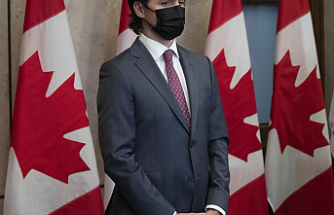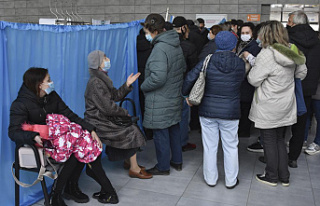Human rights activists have expressed concern about Afghans being diverted to Camp Bondsteel, Kosovo, over the past six week. They cite a lack transparency regarding their status and reasons for keeping them back. It is not clear what will happen to anyone who cannot be cleared to travel to the United States.
Jelena Sesar is a researcher at Amnesty International, who specializes on the Balkans. "What happens to these people, particularly those who have not passed security vetting?" Will they be held? Is there any legal aid available to them? What is their plan? Are they at risk of being sent back to Afghanistan?
As the Biden administration works feverishly for the resettlement of Afghans who fled Afghanistan after the Taliban tookover in August, it says it is too early to answer some of these questions.
It has been difficult for those who monitor the fate of refugees to find out what information is available. Sunil Varghese is the policy director of the International Refugee Assistance Project. He stated that there's not much transparency regarding the security check system. "We don’t know the reasons people are sent to Kosovo for extra screening, what it is and how long it will take.
Since Aug. 17, more than 66,000 Afghans have entered the U.S., and are currently undergoing what is described by the government as a rigorous security screening process to screen for national security threats. This includes people who served as interpreters for the American military and their country's armed forces.
About 55,000 of them are currently at U.S. bases across the country. They complete immigration processing, medical evaluations, and quarantine before they settle in the United States. According to the Department of Homeland Security (which is overseeing Operation Allies Welcome), there are still 5,000 people who were evacuated from transit points in Europe and the Middle East.
After President Joe Biden's criticisms of his frantic evacuation of U.S forces and allies in Afghanistan as part of the withdrawal, intense scrutiny is being placed on the resettlement effort. This was initiated when President Donald Trump signed a peace agreement with the Taliban to end America’s longest war.
Trump and other Republicans allege that the Biden administration allowed Afghan refugees to enter the United States without conducting background checks. Alejandro Mayorkas, Homeland Secretary, has defended screening and stated that there have been no threats to the refugees arriving.
According to U.S. officials, the exact number at Camp Bondsteel, Kosovo, a tiny nation in southeastern Europe, fluctuates with new people arriving and leaving when security issues such as missing documents are resolved.
The close ally of the U.S., Kosovo, has offered to allow refugees to stay on its territory for one year. A separate group is also located at Bondsteel. It hosts Camp Bechtel, a temporary refuge for Afghans who served NATO countries during the war.
According to one U.S. official who spoke under anonymity to discuss non-public information, Camp Bondsteel saw approximately 30 Afghan evacuees and about 170 family members for several weeks.
They are not in detention but are still in a sort of limbo.
They had volunteered to evacuate Afghanistan, but they were flagged at one transit point in Europe or the Middle East and told that they must go to Kosovo. A senior administration official said that some of them chose to take their families along while authorities worked with analysts from DHS, FBI and other agencies to solve questions about their identities or past associations.
The senior official said that they are allowed to move around the base, but cannot leave the country if the government of Kosovo has set conditions. He spoke on condition of anonymity in order to discuss security and diplomatic concerns.
According to a senior administration official, those sent to Bondsteel represent people who need "significant further consideration" which includes interviews and analysis before authorities are comfortable allowing them to travel to the U.S.
Some cases have been determined "suitable" for travel to the United States. In others, however, "work continues" and the cases are still unresolved. The senior administration official did not give a breakdown of the numbers involved.
The U.S. has not yet sent anyone back to Afghanistan. However, the U.S. will determine the fate of any person who fails to make it through the vetting process. This could include resettling them in another country in certain cases, this official stated.
Bondsteel is still off-limits to outsiders. This includes lawyers who could represent people there if they're not allowed to enter the U.S.A. A situation that does not sit well with advocates such as Sesar. She said that there is no real access to the camp. "There is no independent or public scrutiny of what happens there."









